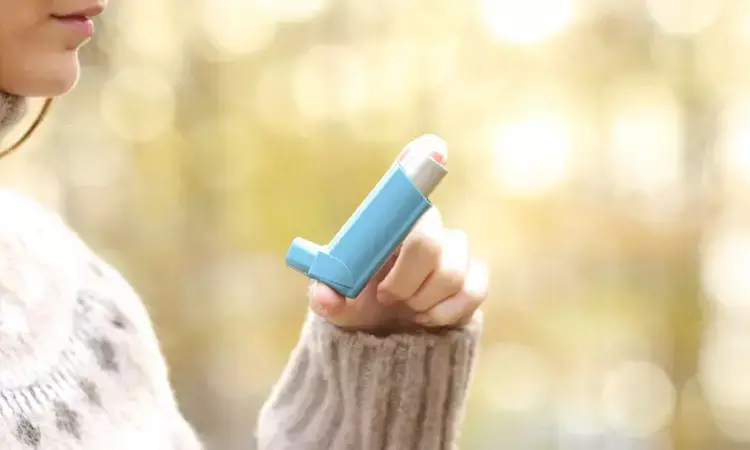- Home
- Medical news & Guidelines
- Anesthesiology
- Cardiology and CTVS
- Critical Care
- Dentistry
- Dermatology
- Diabetes and Endocrinology
- ENT
- Gastroenterology
- Medicine
- Nephrology
- Neurology
- Obstretics-Gynaecology
- Oncology
- Ophthalmology
- Orthopaedics
- Pediatrics-Neonatology
- Psychiatry
- Pulmonology
- Radiology
- Surgery
- Urology
- Laboratory Medicine
- Diet
- Nursing
- Paramedical
- Physiotherapy
- Health news
- Fact Check
- Bone Health Fact Check
- Brain Health Fact Check
- Cancer Related Fact Check
- Child Care Fact Check
- Dental and oral health fact check
- Diabetes and metabolic health fact check
- Diet and Nutrition Fact Check
- Eye and ENT Care Fact Check
- Fitness fact check
- Gut health fact check
- Heart health fact check
- Kidney health fact check
- Medical education fact check
- Men's health fact check
- Respiratory fact check
- Skin and hair care fact check
- Vaccine and Immunization fact check
- Women's health fact check
- AYUSH
- State News
- Andaman and Nicobar Islands
- Andhra Pradesh
- Arunachal Pradesh
- Assam
- Bihar
- Chandigarh
- Chattisgarh
- Dadra and Nagar Haveli
- Daman and Diu
- Delhi
- Goa
- Gujarat
- Haryana
- Himachal Pradesh
- Jammu & Kashmir
- Jharkhand
- Karnataka
- Kerala
- Ladakh
- Lakshadweep
- Madhya Pradesh
- Maharashtra
- Manipur
- Meghalaya
- Mizoram
- Nagaland
- Odisha
- Puducherry
- Punjab
- Rajasthan
- Sikkim
- Tamil Nadu
- Telangana
- Tripura
- Uttar Pradesh
- Uttrakhand
- West Bengal
- Medical Education
- Industry
Twice-Yearly Depemokimab Effectively Lowers Exacerbation Rates in Severe Eosinophilic Asthma: Study Reveals

USA: A recent study published in the New England Journal of Medicine highlights the effectiveness of Depemokimab, an innovative monoclonal antibody, in managing severe asthma among patients with an eosinophilic phenotype.
The findings reveal that administering Depemokimab twice yearly significantly lowers the annualized rate of asthma exacerbations, offering hope for better disease management.
Eosinophilic asthma, characterized by elevated eosinophil levels in the airways, often leads to more severe symptoms and frequent exacerbations compared to other asthma phenotypes. Traditional treatments may not always provide adequate relief, prompting the need for targeted therapies like Depemokimab, which specifically aims to reduce inflammation associated with eosinophils. Depemokimab is a long-acting biologic therapy with improved binding affinity for interleukin-5, potentially allowing for effective dosing every six months.
In this context, David J. Jackson, the King’s College London, London, and colleagues assessed the efficacy and safety of depemokimab in patients with severe asthma characterized by an eosinophilic phenotype. This phenotype was defined by a high eosinophil count (≥300 cells per microliter in the past 12 months or ≥150 cells per microliter at screening) and a history of exacerbations despite receiving medium- or high-dose inhaled glucocorticoids. The evaluation was conducted through phase 3A, randomized, placebo-controlled trials known as SWIFT-1 and SWIFT-2.
Patients were randomly assigned in a 2:1 ratio to receive either 100 mg of depemokimab administered subcutaneously or placebo at weeks 0 and 26, along with standard care. The primary endpoint was the annualized rate of exacerbations at 52 weeks. Secondary endpoints, analyzed hierarchically to account for multiple comparisons, included changes from baseline in the St. George’s Respiratory Questionnaire (SGRQ) scores, forced expiratory volume in one second (FEV1), and reports of asthma symptoms at 52 weeks.
The researchers reported the following findings:
- Across the two trials, 792 patients were randomized, with 762 included in the full analysis—502 received depemokimab and 260 received placebo.
- In the SWIFT-1 trial, the annualized rate of exacerbations was 0.46 for the depemokimab group compared to 1.11 for the placebo group, resulting in a rate ratio of 0.42.
- In SWIFT-2, the annualized rates were 0.56 for depemokimab and 1.08 for placebo, yielding a rate ratio of 0.52.
- No significant differences in the change from baseline in SGRQ scores were found in either trial, precluding statistical inferences for subsequent secondary endpoints.
- In both trials, adverse event occurrence was comparable between the two groups.
The findings showed that depemokimab decreased the annualized rate of exacerbations in patients with severe asthma characterized by an eosinophilic phenotype.
"The study's outcomes signal a promising advancement in asthma care, especially for those suffering from the eosinophilic form of the disease. With ongoing research and potential regulatory approvals on the horizon, Depemokimab could soon become a vital tool in the fight against severe asthma," the researchers concluded.
Reference:
Jackson DJ, Wechsler ME, Jackson DJ, Bernstein D, Korn S, Pfeffer PE, Chen R, Saito J, de Luíz Martinez G, Dymek L, Jacques L, Bird N, Schalkwijk S, Smith D, Howarth P, Pavord ID; SWIFT-1 and SWIFT-2 Investigators. Twice-Yearly Depemokimab in Severe Asthma with an Eosinophilic Phenotype. N Engl J Med. 2024 Sep 9. doi: 10.1056/NEJMoa2406673. Epub ahead of print. PMID: 39248309.
Dr Kamal Kant Kohli-MBBS, DTCD- a chest specialist with more than 30 years of practice and a flair for writing clinical articles, Dr Kamal Kant Kohli joined Medical Dialogues as a Chief Editor of Medical News. Besides writing articles, as an editor, he proofreads and verifies all the medical content published on Medical Dialogues including those coming from journals, studies,medical conferences,guidelines etc. Email: drkohli@medicaldialogues.in. Contact no. 011-43720751


